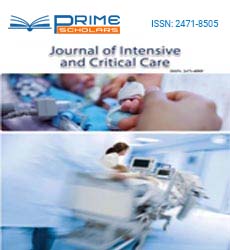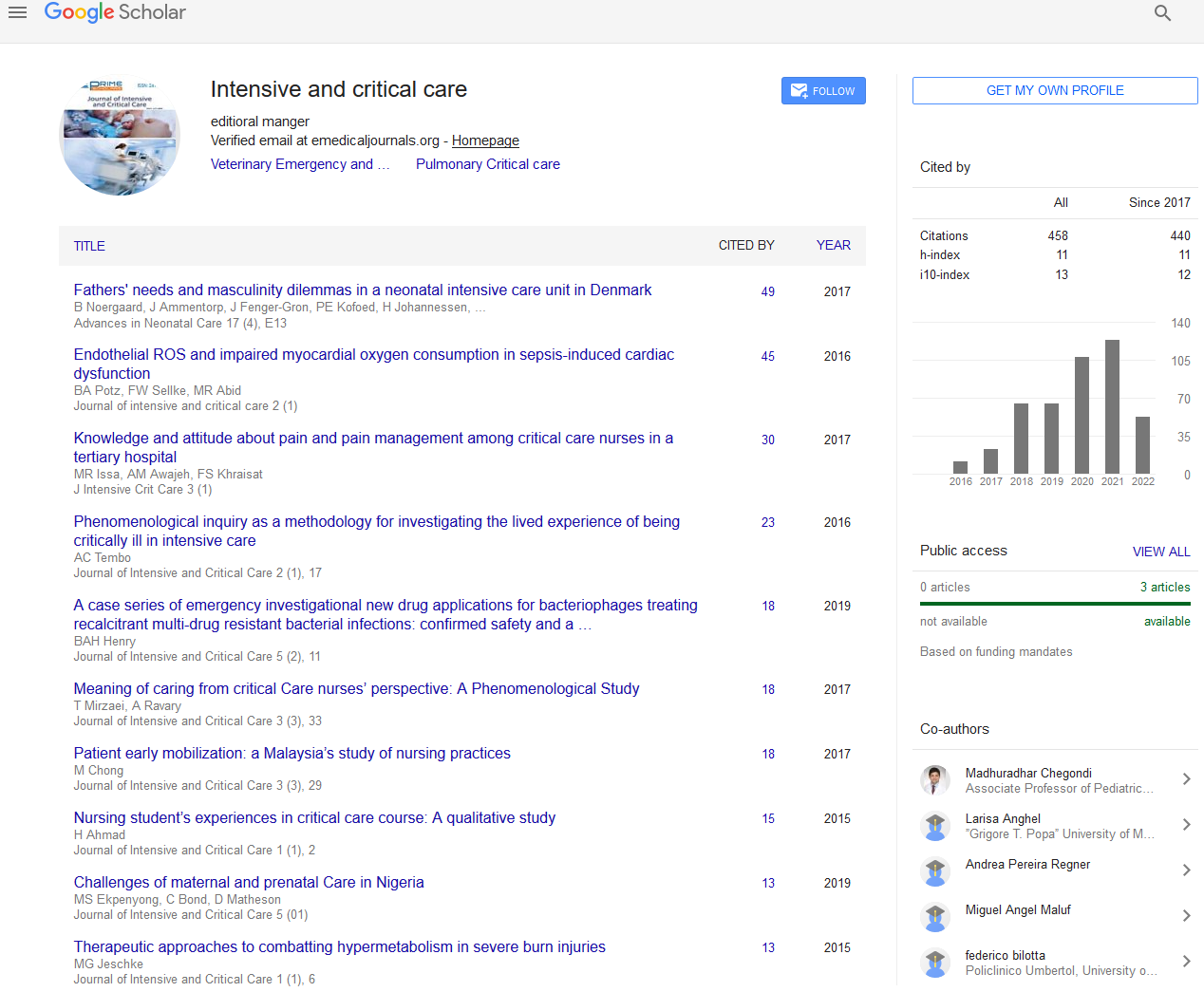Opinion - (2023) Volume 9, Issue 5
Impact of Decolonization Protocols in Paediatric Intensive Care Patients
Katharina Staufer*
Department of Cancer and Genomic Sciences, University of Birmingham, UK
*Correspondence:
Katharina Staufer,
Department of Cancer and Genomic Sciences, University of Birmingham,
UK,
Email:
Received: 02-Oct-2023, Manuscript No. IPJICC-23-18293;
Editor assigned: 04-Oct-2023, Pre QC No. IPJICC-23-18293 (PQ);
Reviewed: 18-Oct-2023, QC No. IPJICC-23-18293;
Revised: 23-Oct-2023, Manuscript No. IPJICC-23-18293 (R);
Published:
30-Oct-2023, DOI: 10.35248/2471-8505-9.5.49
Introduction
Paediatric critical care is a medical specialty that plays a vital
role in saving and improving the lives of critically ill children. It
encompasses a wide range of medical interventions, technologies,
and highly specialized teams dedicated to providing the
best possible care to children facing life-threatening conditions.
However, as with any medical field, paediatric critical care is
not without its drawbacks. This article will explore some of the
drawbacks and challenges associated with paediatric critical
care, shedding light on the complexities and ethical dilemmas
that paediatric critical care professionals must navigate. One
significant drawback of paediatric critical care is its resource-intensive
nature. Treating critically ill children often requires a
multitude of resources, including specialized equipment, highly
trained medical personnel, and dedicated facilities. The
cost associated with paediatric critical care can be exorbitant,
straining healthcare systems and placing a significant financial
burden on families. Working in paediatric critical care can take
an emotional toll on healthcare professionals. Witnessing the
suffering of young patients and the distress of their families can
lead to burnout and psychological stress. Healthcare providers
in this field often face the challenge of maintaining their emotional
well-being while delivering the highest standard of care.
Description
Paediatric critical care is fraught with ethical dilemmas. Decisions
regarding treatment options, including end-of-life care,
can be heart-wrenching. Healthcare providers must weigh the
potential benefits of treatment against the potential harm and
consider the child’s best interests while respecting the wishes
of parents or legal guardians. Balancing medical ethics and
family preferences is an ongoing challenge. There is a shortage
of paediatric critical care specialists in many regions. The scarcity
of specialized professionals can lead to longer waiting times
for care and a reduced ability to provide timely interventions.
The lack of paediatric intensivists can affect the quality of care
provided to critically ill children. Survivors of critical illness in
childhood may face long-term psychological and developmental
consequences. Prolonged hospitalization, invasive treatments,
and the trauma of the critical care environment can
lead to Post Traumatic Stress Disorder (PTSD), anxiety, and other
psychological issues. The long-term impact on a child’s quality
of life and their family’s well-being is a significant concern.
Paediatric critical care often involves complex family dynamics.
Parents may struggle with feelings of guilt, helplessness, and
emotional distress when their child is critically ill. Siblings may
experience feelings of neglect or anxiety. Healthcare providers
must navigate these family dynamics while providing care and
support.
Conclusion
The use of potent medications and complex procedures in paediatric
critical care comes with inherent risks. Medication errors,
complications from procedures, and drug-related adverse
events are concerns that healthcare professionals must be
vigilant about. These risks can lead to additional health problems
for critically ill children. Compared to adult critical care,
there is limited research and funding dedicated to paediatric
critical care. This can result in a lack of evidence-based practices
and guidelines specific to paediatric populations, making
it challenging to provide the best care possible. Effective communication
with critically ill children can be challenging due to
their developmental stage and the use of medical equipment.
Paediatric critical care providers must find innovative ways to
communicate with their patients and ensure they understand
what is happening to them, which can be a daunting task.
Citation: Staufer K (2023) Impact of Decolonization Protocols in Paediatric Intensive Care Patients. J Intensive Crit Care. 9:49.
Copyright: © 2023 Staufer K. This is an open-access article distributed under the terms of the Creative Commons Attribution License, which permits unrestricted use, distribution, and reproduction in any medium, provided the original author and source are credited.

